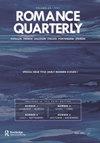Jordi Puntí的Els castellans:重塑加泰罗尼亚的移民和融合叙事
IF 0.2
3区 文学
0 LITERATURE, ROMANCE
引用次数: 0
摘要
摘要加泰罗尼亚著名作家Jordi Puntí的虚构回忆录Els castellans(2011)为加泰罗尼亚当代关于移民和民族认同的辩论做出了重要贡献。这本关于两个对立男孩群体的半自传体小插曲集以20世纪70年代的小工业城市曼莱乌为背景,讲述了Puntí的青春期,也讲述了加泰罗尼亚省为融入20世纪中期来到该地区的大量西班牙工人阶级移民而进行的斗争。Els castellans从加泰罗尼亚人的角度讲述了20世纪50年代至70年代移民潮的经历,这是一部开创性的文学作品。本文采用地理方法来研究回忆录如何质疑加泰罗尼亚人和西班牙移民之间的分歧,主张将《艾尔斯城堡》解读为加泰罗尼亚和西班牙政治过渡的成年寓言,为加泰罗尼亚的移民史提供急需的清算。与此同时,这本回忆录在空间上将世纪中期的西班牙移民与当今的摩洛哥移民联系起来,揭示了人们对流动性的反复恐惧。Els castellans通过阐述一个动态、双向的融合过程来对抗这种恐惧,这个过程改变了宿主和移民。本文章由计算机程序翻译,如有差异,请以英文原文为准。
Jordi Puntí’s Els castellans: Reshaping Catalan narratives of immigration and integration
Abstract Acclaimed Catalan writer Jordi Puntí’s fictional memoir Els castellans (2011) offers an important contribution to contemporary debates on immigration and national identity in Catalonia. Set in the 1970s in the small industrial city of Manlleu, this collection of semi-autobiographical vignettes about two rival groups of boys narrates not only Puntí’s adolescence, but also provincial Catalonia’s struggle to integrate large numbers of working-class Spanish migrants who arrived to the region in the mid-twentieth century. Els castellans is groundbreaking in its literary telling of the experience of the 1950s–1970s migratory wave from a Catalan-identified point of view. Adopting a geographical approach to examine how the memoir interrogates the divisions between Catalans and Spanish migrants, this essay argues for reading Els castellans as a coming-of-age allegory of Catalan and Spanish political transitions that provides a much-needed reckoning with Catalonia’s history of immigration. At the same time, the memoir spatially connects the mid-century Spanish migrants to present-day Moroccan immigrants, revealing a recurring fear of mobility. Els castellans counters this fear by articulating a dynamic, bidirectional integration process that transforms the host as much as the migrant.
求助全文
通过发布文献求助,成功后即可免费获取论文全文。
去求助
来源期刊

ROMANCE QUARTERLY
LITERATURE, ROMANCE-
CiteScore
0.30
自引率
50.00%
发文量
18
期刊介绍:
Lorca and Baudelaire, Chrétien de Troyes and Borges. The articles in Romance Quarterly provide insight into classic and contemporary works of literature originating in the Romance languages. The journal publishes historical and interpretative articles primarily on French and Spanish literature but also on Catalan, Italian, Portuguese, and Brazilian literature. RQ contains critical essays and book reviews, mostly in English but also in Romance languages, by scholars from universities all over the world. Romance Quarterly belongs in every department and library of Romance languages.
 求助内容:
求助内容: 应助结果提醒方式:
应助结果提醒方式:


